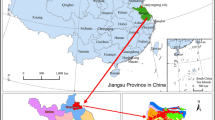Abstract
This paper presents the design of a simulation model for social ecological systems based on multi-agent systems. The multi-agent system incorporates subsets of intelligent agents that make decisions according to their environment and productive activity, resulting on a human-like behavior. A BDI model is proposed to model the behavior of agents simulating human entities. This allows to have a tool for decision making that can be adjusted to real data, as well as a behavior not only statistical but emergent, self-organized and adaptive. The proposed simulation model involves, in the same context, social, environmental, economic and spatial variables, i.e. social-ecological systems. Therefore, it has the potential to support decision makers in the country (mayors, governors, ministers, among others), allowing them to have a tool that shows the interaction between different entities with results in territorial planning processes.
Access this chapter
Tax calculation will be finalised at checkout
Purchases are for personal use only
Similar content being viewed by others
References
Ostrom, E.: A general framework for analyzing sustainability of social-ecological systems. Science 325, 419–422 (2009)
Liu, J., et al.: Complexity of coupled human and natural systems. Science 317, 1513–1516 (2007)
de Groot, R.S., Alkemade, R., Braat, L., Hein, L., Willemen, L.: Challenges in integrating the concept of ecosystem services and values in landscape planning, management and decision making. Ecol. Complex 7(3), 260–272 (2010)
Schulze, J., Müller, B., Groeneveld, J., Grimm, V.: Agent-based modelling of social-ecological systems: achievements, challenges, and a way forward. J. Artif. Soc. Soc. Simul. 20, 2 (2017)
Schlueter, M., Mueller, B.: New horizons for managing the environment: a review of coupled social-ecological systems modeling. Nat. Resour. Model. 25, 219–272 (2012)
An, L., Zvoleff, A., Liu, J., Axinn, W.: Agent-based modeling in coupled human and natural systems (CHANS): lessons from a comparative analysis. Ann. Assoc. Am. Geograph. 104, 723–745 (2014)
Matthews, R.B., Gilbert, N.G., Roach, A., Polhill, J.G., Gotts, N.M.: Agent-based land-use models: a review of applications. Landscape Ecol. 22, 1447–1459 (2007). https://doi.org/10.1007/s10980-007-9135-1
González, E., Torres, M., Rodriguez, J.: La Metodologia AOPOA. Rev. Av. Eng Sist. E Inform. 4, 8 (2007)
de Senna Carneiro, T.G., de Andrade, P.R., Camara, G., Vieira Monteiro, A.M., Pereira, R.R.: An extensible toolbox for modeling nature-society interactions. Environ. Model Softw. 46, 104–117 (2013)
Ángel, R.S.: MSSIN: Modelo de Simulación Social basado en Agentes con un Enfoque Inteligente. Universidad Javeriana, Systems Engeniering PI113-01 (2012)
Enrique, G., Cesar, B., Jamir, A.: Agents for Concurrent Programming. CPA 2003, pp 157–166. Enschende-Holanda, IOS Press, September 2003
Wooldridge, M.: Reasoning about Rational Agents. The MIT Press, Cambridge (2000)
Author information
Authors and Affiliations
Corresponding author
Editor information
Editors and Affiliations
Rights and permissions
Copyright information
© 2020 Springer Nature Switzerland AG
About this paper
Cite this paper
Muto, T.J., Bolivar, E.B., González, E. (2020). BDI Multi-agent Based Simulation Model for Social Ecological Systems. In: De La Prieta, F., et al. Highlights in Practical Applications of Agents, Multi-Agent Systems, and Trust-worthiness. The PAAMS Collection. PAAMS 2020. Communications in Computer and Information Science, vol 1233. Springer, Cham. https://doi.org/10.1007/978-3-030-51999-5_23
Download citation
DOI: https://doi.org/10.1007/978-3-030-51999-5_23
Published:
Publisher Name: Springer, Cham
Print ISBN: 978-3-030-51998-8
Online ISBN: 978-3-030-51999-5
eBook Packages: Computer ScienceComputer Science (R0)




